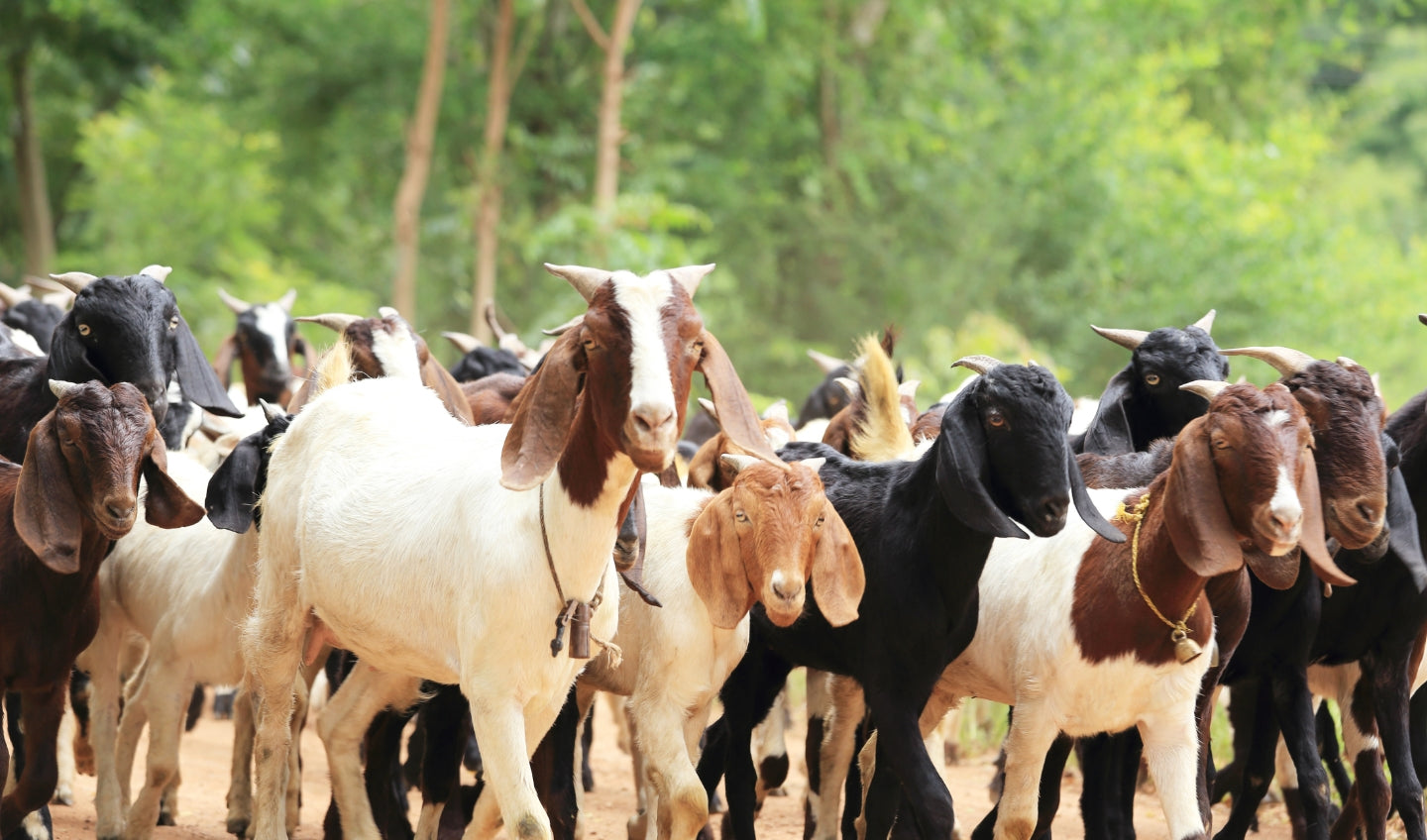While cow's milk formula has long been the go-to choice for many parents, the increasing popularity of goat milk formula has sparked curiosity and raised questions about its suitability as an alternative.
As a parent, we know that your child's well-being is at the forefront of any decision you make, and understanding the potential benefits and considerations of goat milk formula is essential in making an informed choice.
In this article, we will explore our favorite European goat milk formulas and whether goat milk formula is a good alternative to cow's milk formula for your baby, examining its composition, digestibility, potential allergenicity, and other factors that may influence your decision.
Contents
- Popular European Goat Milk Formula Brands: Holle, HiPP, Jovie, and Nannycare
- European Organic Certifications and Quality Control
- Nutritional Comparison: Goat's Milk Formula vs. Cow's Milk Formula
- Digestibility and Allergenicity of Goat Milk Formula
- Taste and Texture of Goat Milk Formula
- Considerations for Transitioning to Goat Milk Formula
- Frequently Asked Questions About Goat Milk Formula
Popular European Goat Milk Formula Brands: Holle, HiPP, Jovie, and Nannycare
European infant formula is trusted by many parents globally due to its commitment to high-quality ingredients, rigorous testing, and adherence to strict regulations. Come along with us as we introduce you to the top goat milk-based formula from Europe!
Holle Goat
Holle offers organic goat milk-based infant formulas that are certified organic and biodynamic, made primarily from Demeter-quality goat milk, and designed to provide a balanced and nutritious diet for infants. Demeter is the most strict European organic private certification, and Holle is the only brand to produce goat formula in Demeter quality!
With a range of stages tailored to different age groups, Holle Goat formulas meet strict quality control standards and prioritize the use of natural ingredients. It is a trusted choice for parents seeking organic and natural alternatives to cow milk-based formulas while still ensuring their baby's nutritional needs are met.
Here are some of the unique features of Holle Goat:
Pros:
- Vegetarian-friendly.
- Contains ARA (Omega-6) and plant-based DHA (Omega-3).
- Has a short ingredients list and is made primarily from organic goat milk.
- Available in four stages, designed to correspond with the different developmental milestones of a child.
Cons:
-
One drawback of this product is that it contains maltodextrin, a complementary carbohydrate which some parents prefer to avoid. However, Holle Goat Stage PRE is lactose only, meaning no added maltodextrin!
HiPP Goat
HiPP Goat milk formulas are a popular option for parents seeking organic and gentle alternatives to cow milk-based formulas. HiPP, a well-established brand, offers a range of goat milk formulas that are carefully crafted to meet the nutritional needs of infants.
Their formulas are made from organic goat milk and enriched with essential vitamins, minerals, and prebiotics to support healthy growth and development.
Here are some of the unique features of HiPP Goat:
Pros:
- Contains ARA (Omega-6) and DHA (Omega-3), which are essential fatty acids important for infant development.
- Made from gentle A2 goat milk, which may be easier to digest for some babies.
- Enriched with prebiotics (GOS), which can support a healthy gut microbiome in infants.
Cons:
- It contains palm oil (from sustainable cultivation).
- It includes fish oil, making it unsuitable for a vegetarian diet
Jovie
Jovie is a Dutch company that was founded by baby nutrition experts and parents with the goal of creating a gentle formula for babies. Their formulas feature organic whole goat milk as the primary ingredient, which naturally contains beneficial nutrients, eliminating the need for undesirable additives like palm oil.
The company prioritizes carefully selected ingredients with minimal environmental impact and holds organic certification from the European Union. Jovie whole milk formulas are produced without synthetic pesticides, herbicides, GMOs, or hormones, ensuring a high-quality and natural option for infants!
Here are some of the unique features of Jovie:
Pros:
- Made solely from whole goat's milk, without the use of maltodextrin or palm oil.
- Enriched with prebiotics which feeds your baby' healthy gut bacteria.
- Contains DHA (Omega-3) and AA (Omega-6), which are essential fatty acids important for infant development.
- Includes vitamins E, C, D3, and iron, which contribute to a healthy immune system.
Cons:
-
This product contains fish oil, making it unsuitable for those following a vegetarian diet
Nannycare
With 30 years of experience, Nannycare leads in goat milk formula clinical research, offering parents a safe, sustainable, and high-quality option for their little ones.
Their goat milk formula is a uniquely made and high-quality product that prioritizes simplicity and quality. They meticulously monitor each step of the process, from selecting goats and their natural forage diet to preserve the nutritional qualities of the milk.
Here are some of the unique features of Nannycare:
Pros:
- Free of maltodextrin, palm oil, GMOs, and soy, making it a desirable option for those seeking a more natural formula.
- Contains DHA (Omega-3) and AA (Omega-6), which are essential fatty acids important for infant development.
- The milk used in the formula comes from grass-fed goats raised on natural pastures, which can be appealing to those concerned about the source of the ingredients.
Cons:
-
Contains fish oil, which means it is not suitable for individuals following a vegetarian diet
No matter which goat milk-based formula you opt for, rest assured that each one is crafted with utmost care using wholesome ingredients!
European Organic Certifications and Quality Control
The organic certification standards in Europe are among the most comprehensive and stringent in the world, ensuring that organic goat milk formula meets strict infant nutrition and safety criteria throughout the production process.
In Europe, organic formula is certified according to regulations set by the European Union (EU). These regulations prohibit the use of synthetic pesticides, genetically modified organisms (GMOs), and artificial additives in the production of organic infant formula.
Nutritional Comparison: Goat's Milk Formula vs. Cow's Milk Formula
When choosing between cow milk formula and goat milk infant formula for your baby, it is important to consider their macronutrient and micronutrient profiles. While there are similarities in nutritional content, there are also notable differences in the composition of protein, fat, and carbohydrates.
Similarities
Both goat milk formula and cow's milk formula provide essential macronutrients such as protein, fat, and carbohydrates, as well as important micronutrients, including vitamins and minerals. They aim to mimic the composition of breast milk and support healthy growth and development in infants.
In terms of similarities, both formulas contain similar amounts of calories per serving, providing the necessary energy for your baby. They also contain essential vitamins and minerals, including calcium, vitamin D, iron, and others, which are crucial for bone health, immune function, and overall growth.
Furthermore, both formulas undergo rigorous quality control and safety regulations to ensure they meet specific standards for infant nutrition. This includes testing for contaminants and ensuring proper processing and packaging.
Differences
However, there are differences in protein, fat, and carbohydrate composition between goat milk formula and cow's milk infant formula.
Protein Composition:The protein composition in goat milk formula differs from cow's milk formula. Goat milk contains a higher proportion of certain types of proteins, such as whey protein, which is generally considered easier to digest.
This can be more gentle on a baby's tummy and beneficial for babies that experience discomfort with cow's milk-based formulas. Importantly, the protein structure is similar in both kinds of milk and, thus, is unsuitable for babies with cow's milk protein allergy (CMPA) as it may also trigger an allergic reaction.
Fat Composition:The fat composition in goat formula also varies slightly. Goat milk has a different fatty acid profile compared to cow's milk, with higher levels of medium-chain fatty acids. These fatty acids are believed to be more easily digested and absorbed by infants. Additionally, the smaller size of fat globules in goat milk may contribute to better fat digestion and tolerance.
Lactose Content: Goat milk formula typically contains lower levels of lactose compared to cow's milk formula. However, regardless of what kind of milk-based formula you opt for, in Europe, it's required that a minimum of 30% of carbohydrates in infant formula come from lactose. Moreover, a formula that contains lactose is unsuitable for babies who are lactose intolerant.
Taste and Smell:The taste and smell of goat milk formula differ from cow's milk infant formula. Some babies may prefer the taste of one over the other. If your baby seems more accepting of one type of formula, it can help ensure better feeding experiences!
While these differences exist between cow's milk and goat's milk, when it comes to infant formulas, each product is adapted to contain the exact nutrients that babies need for optimal health.
So, when choosing the best baby formula, it really comes down to what works best for your little one in terms of taste, digestibility and overall preference.
Digestibility and Allergenicity of Goat Milk Formula
One of the key factors that sets goat milk formula apart from cow's milk formula is its digestibility. The protein structure of goat milk formula is often considered easier to digest for some infants compared to cow's milk formula. Goat milk protein forms a softer curd in the stomach, which can aid in digestion and potentially reduce discomfort or digestive issues in babies.
In terms of allergenicity, goat milk formula generally has a lower allergenic potential compared to cow milk formula. The proteins in goat's milk, although not identical to human breast milk, differ from the proteins in cow's milk.
This difference in protein composition may make goat milk formula a better option for infants who experience sensitivities to cow's milk protein. It is important to note, however, that goat milk infant formula is not a hypoallergenic formula and is not recommended for babies with CMPA or lactose intolerance.
While the proteins in goat's milk differ somewhat from those in cow's milk, they still share similarities that can trigger allergic reactions in infants with a true milk protein allergy. Similarly, lactose intolerance, which is the inability to digest lactose (the sugar found in milk), may still pose a challenge with goat milk-based formula since it still contains lactose.
Taste and Texture of Goat Milk Formula
When considering goat milk formula as an alternative to cow's milk formula, it is important to understand the potential differences in taste and texture.
The taste of goat milk baby formula
Some parents and babies may notice a difference in taste between goat's milk and cow's milk formula. Goat's milk is often described as having a milder and sweeter taste compared to cow's milk. This difference in taste can influence your baby's acceptance of the formula and their overall feeding experience.
The texture of goat milk baby formula
Texture variations can also be observed in goat milk. Due to differences in fat globule size, goat milk may have a slightly different texture compared to cow's milk formula. The smaller fat globules in goat's milk may result in a smoother consistency, which can impact the mouthfeel and overall experience for your baby.
Considerations for Transitioning to Goat Milk Formula
When transitioning your baby to goat milk formula, there are a few important considerations to keep in mind:
1. Gradual transition: It is generally recommended to introduce goat milk formula gradually, mixing it with your baby's current formula. This approach can help your baby adjust to the taste and texture of goat milk formula more easily.
2. Observation of tolerance: As with any formula transition, it is essential to observe your baby's reaction and tolerance to the new formula. Look out for any signs of discomfort, digestive issues, or allergic reactions. If you notice any concerning symptoms, consult with your healthcare professional for further guidance.
3. Individual preferences: Some babies may readily accept the transition to goat milk formula, while others may require more time to adjust. Patience and flexibility can help make the process smoother for both you and your baby.
4. Professional advice: It is always advisable to consult with your healthcare professional or pediatrician before making any changes to your baby's formula. They can provide personalized recommendations based on your baby's specific needs, dietary considerations, and any existing health conditions.
By considering taste, texture, and transitioning guidelines, you can help ensure a successful transition to goat milk formula and provide your baby with a formula that aligns with their nutritional needs and preferences.
Frequently Asked Questions About Goat Milk Formula
Do you still have some questions about goat milk formula and how it can benefit your baby? Then check out these quick FAQs!
Can goat milk formula replace breastfeeding or cow's milk formula?
Breast milk is the ideal source of nutrition for infants. However, circumstances may arise where breastfeeding is not feasible or desired. In such cases, both cow's milk formula and goat milk formula serve as suitable alternatives to nourish your little one.
Ultimately, the decision between cow's milk formula and goat milk formula depends on factors such as your baby's individual needs, sensitivities or allergies, and the recommendations of a healthcare professional.
Is goat milk formula suitable for all babies?
While goat milk formula can be a suitable option for many infants, it may not be appropriate for all babies. Some infants may have specific dietary needs or medical conditions that require specialized formulas.
It is important to consult with a healthcare professional or pediatrician to assess your baby's individual needs and determine if goat milk formula is suitable for them. Goat milk formula should not be used as a replacement for cow's milk formula in babies with CMPA or lactose intolerance.
How do I know if my baby will benefit from goat milk formula?
The decision to use goat milk formula should be made in consultation with a healthcare professional. Goat milk formula may be beneficial for babies who have difficulties digesting cow's milk formula. However, individual responses can vary, and professional guidance is important in assessing your baby's specific needs and determining if goat milk formula is appropriate for them.
Wrapping Up: Deciding if Goat Milk Formula is Right for Your Baby
To determine if goat milk formula is suitable for your baby, consider the benefits and drawbacks it offers. Goat milk formula may provide easier digestibility and lower allergenic potential compared to cow's milk formula, making it a viable option for some infants. However, it is crucial to consult with healthcare professionals who can assess your baby's individual needs, medical history, and potential dietary concerns.
If you conclude that goat milk formula is the perfect fit for your little bundle of joy, we've got you covered! From trusted names like Holle, HiPP, Kendamil, Jovie, and Nannycare, we offer a one-stop shop for the best goat milk formulas on the market.
Visit Baby Milk Bar to explore our range of European goat milk formulas and access valuable information on infant feeding options.
Breast milk is the best source of nutrition for babies. Before altering your baby's diet or feeding routine, consult your healthcare provider for personalized recommendations. The information in this article is strictly for informational purposes and is not a substitute for medical advice.





